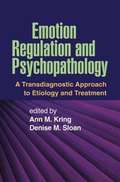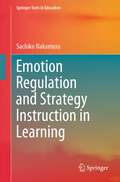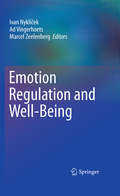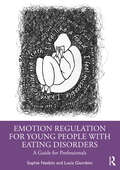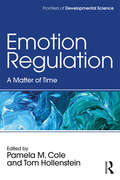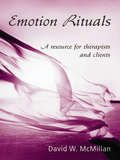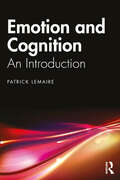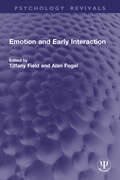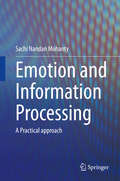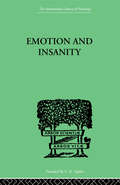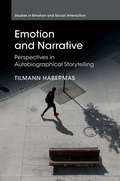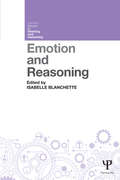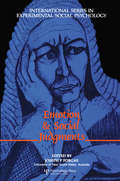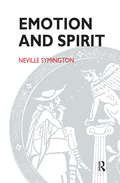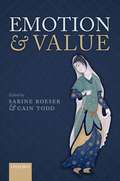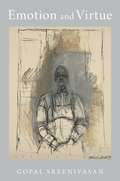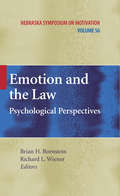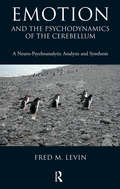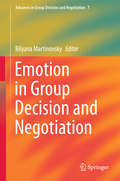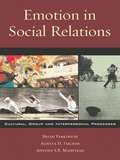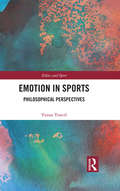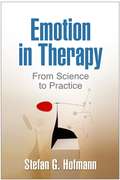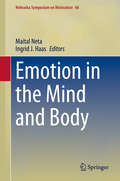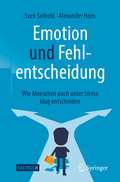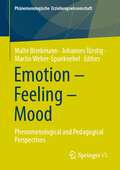- Table View
- List View
Emotion Regulation and Psychopathology
by Denise Sloan Ann KringRegardless of their specific diagnosis, many people seeking treatment for psychological problems have some form of difficulty in managing emotional experiences. This state-of-the-art volume explores how emotion regulation mechanisms are implicated in the etiology, development, and maintenance of psychopathology. Leading experts present current findings on emotion regulation difficulties that cut across diagnostic boundaries and present psychotherapeutic approaches in which emotion regulation is a primary target of treatment. Building crucial bridges between research and practice, chapters describe cutting-edge assessment and intervention models with broad clinical utility, such as acceptance and commitment therapy, mindfulness-based therapy, and behavioral activation treatment.
Emotion Regulation and Strategy Instruction in Learning (Springer Texts in Education)
by Sachiko NakamuraThis textbook is written for teachers, practitioners, and researchers, who are interested in developing their knowledge about emotions and learning about ways of helping their learners to cultivate positive and cope with negative emotions. The book covers the topics of emotions, emotion regulation, strategies, and instruction. Each topic is discussed in the subsequent chapters, beginning with a concise summary of theories and research in the fields of psychology, education, and language learning. This is followed by its practical applications in the classroom, with suggestions and ideas based on research as well as reports from teachers in a wide range of contexts. Teachers’ vignettes give readers an opportunity to compare their experiences with others. A practical guide with detailed steps for implementing strategy instruction in emotion regulation is provided at the end.
Emotion Regulation and Well-Being
by Marcel Zeelenberg Ivan Nyklíček Ad VingerhoetsEmotion is a basic phenomenon of human functioning, most of the time having an adaptive value enhancing our effectiveness in pursuing our goals in the broadest sense. Regulation of these emotions, however, is essential for adaptive functioning, and suboptimal or dysfunctional emotion regulation may even be counterproductive and result in adverse consequences, including a poor well-being and ill health. This volume provides a state-of-the art overview of issues related to the association between emotion regulation and both mental and physical well-being. It covers various areas of research highly relevant to both researchers in the field and clinicians working with emotion regulation issues in their practice. Included topics are arranged along four major areas: * (Neuro-)biological processes involved in the generation and regulation of emotions * Psychological processes and mechanisms related to the link between emotion regulation and psychological well-being as well as physical health * Social perspective on emotion regulation pertaining to well-being and social functioning across the life span * Clinical aspects of emotion regulation and specific mental and physical health problems This broad scope offers the possibility to include research findings and thought-provoking views of leading experts from different fields of research, such as cognitive neuroscience, clinical psychology, psychophysiology, social psychology, and psychiatry on specific topics such as nonconscious emotion regulation, emotional body language, self-control, rumination, mindfulness, social sharing, positive emotions, intergroup emotions, and attachment in their relation to well-being and health. Chapters are based on the "Fourth International Conference on the (Non) Expression of Emotions in Health and Disease" held at Tilburg University in October 2007. In 2007 Springer published "Emotion Regulation: Conceptual and Clinical Issues" based on the Third International Conference on the (Non) Expression of Emotion in Health and Disease," held at Tilburg University in October 2003. It is anticipated that, depending on sales, we may continue to publish the advances deriving from this conference.
Emotion Regulation for Young People with Eating Disorders: A Guide for Professionals
by Sophie Nesbitt Lucia GiombiniEmotion Regulation for Young People with Eating Disorders is a supportive guide for professionals to help them build effective therapeutic relationships with young people struggling with eating disorders. The book focuses on the role of emotion regulation in the development and maintenance of eating disorders. The psychological concepts discussed are an integration of ideas and theories that have been proposed by many psychologists over the last half-century. The tasks presented in the book use aspects of these theories and concepts in an applied way which can be helpful to enable young people to understand more about their emotional experience and how it has contributed to their difficulties. The approach proposed can be used across the spectrum of eating disorders as the dysfunctional emotional regulation difficulty is shared by all eating disorders. The workbook will be helpful for Children and Adolescent Mental Health Services (CAMHS) professionals such as psychiatrists, psychologists, counsellors, nurses, occupational therapists, dieticians and therapeutic care workers.
Emotion Regulation: A Matter of Time (Frontiers of Developmental Science)
by Tom Hollenstein Pamela M. ColeOne of the most important advances in the study of emotion regulation is understanding it as a dynamic process that develops across the life span. Emotion Regulation focuses on current conceptual and methodological issues in terms of change over various time scales: developmental change across years, as well as changes from day to day, from situation to situation, and from moment to moment. Written by top experts in the field, the volume is organized around three age periods of the life span: infancy and childhood, adolescence, and adulthood. By taking the matter of time seriously, these chapters represent promising and necessary approaches to broadening our knowledge of emotion regulation as a dynamic process that changes with age. The volume provides guidance for future research that will enable researchers to leave behind facile and static conceptualizations of emotion regulation in favor of richer and more explanatory frameworks.
Emotion Rituals: A Resource for Therapists and Clients
by David W. McMillanCognitive behavior therapy does not typically include the use of emtion in its treatment protocols. Emotion Rituals addresses this omission with a thorough discussion of the interplay between thoughts and emotions as vital to the therapeutic process. McMillan's emotion rituals allow clients to apply what they learn in therapy sessions to daily life, fostering continual growth outside of the therapy hour and increasing the effectiveness of each session. McMillan's unique writing style imparts hard facts and theoretical discussion in a conversational tone, presenting new and complicated ideas in a readable and comprehensible manner. Each chapter is devoted to one emotion, and the rituals are suitable for use by both client and therapist, allowing them each to better understand emotion and emotional responses. The result is an accessible and lively text that offers an original approach to healing through feelings.
Emotion and Cognition: An Introduction
by Patrick LemaireThis cutting-edge, yet accessible book provides a complete and integrated assessment of the role of emotions in a wide variety of cognitive functions. Including both empirical and theoretical works and debates, this book presents the results of research aimed at understanding how our emotions influence cognitive performance in diverse areas such as attention, memory, judgment, decision-making or reasoning, and emotional regulation. Drawing on years of research that has enabled psychologists to know when emotions have beneficial versus deleterious effects on cognition, the book explores the mechanisms responsible for these effects. Each chapter focuses on a specific cognitive function and is mirrored by a chapter examining the individual differences in the role of emotions on this aspect of cognition, and how this role changes during aging and in patients with mood disorders. Emotions play a central role in the life of every human being as they crucially guide our actions, thoughts, and relationships, helping us detect and identify what is important, as well as what to memorize, understand, and decide. As such, Emotion and Cognition is a valuable source for all undergraduate and graduate students in the disciplines of cognitive and affective sciences, as well as for experts in the field.
Emotion and Early Interaction (Psychology Revivals)
by Alan Fogel Tiffany FieldOriginally published in 1982, Emotion and Early Interaction is a collection of papers by investigators who had been attempting to integrate emotion and interaction processes in early development. None professed to have all the answers, yet each paper challenges us to question some of our notions about the boundaries between the individual and society. The first part includes chapters on the face-to-face interaction of infants and others during early infancy. These early interactions had become miniature natural laboratories in which many investigators found a wealth of opportunities to study infant emotions and their development. The second part covers play interactions in older infants and toddlers. Here the methods and concepts are different due to the increasing complexity of the infant’s behavior, and the increasing use of linguistic, in addition to non-verbal expressions of emotion. The final part on methodology covers a wide range of issues in the study of early interactions. Today it can be read in its historical context.
Emotion and Information Processing: A Practical approach
by Sachi Nandan MohantyThis book consists of thirteen chapters covering many facts like psycho-social intervention on emotional disorders in individuals, impact of emotion and cognition on blended theory, theory and implication of information processing, effects of emotional self esteem in women, emotional dimension of women in workplace, effects of mental thinking in different age groups irrespective of the gender, negative emotions and its effect on information processing, role of emotions in education and lastly emotional analysis in multi perspective domain adopting machine learning approach. Most of the chapters having experimental studies, with each experiment having different constructs as well as different samples for each data collection. Most of the studies measure information processing within altered mood states, such as depression, anxiety, or positive emotional states, with mental ability tasks being conducted in addition to the experiments of quasi-experimental design.
Emotion and Insanity (International Library Of Psychology)
by Thalbitzer, SFirst published in 1999. Routledge is an imprint of Taylor & Francis, an informa company.
Emotion and Narrative: Perspectives in Autobiographical Storytelling (Studies in Emotion and Social Interaction)
by Tilmann HabermasEmotions have a life beyond the immediate eliciting situation, as they tend to be shared with others by putting the experience in narrative form. Narrating emotions helps us to express, understand, and share them: the way we tell stories influences how others react to our emotions, and impacts how we cope with emotions ourselves. In Emotion and Narrative, Habermas introduces the forms of oral narratives of personal experiences, and highlights a narrative's capacity to integrate various personal and temporal perspectives. Via theoretical proposals richly illustrated with oral narratives from clinical and non-clinical samples, he demonstrates how the form and variety of perspectives represented in stories strongly, yet unnoticeably, influence the emotional reactions of listeners. For instance, narrators defend themselves against negativity and undesired views of themselves by excluding perspectives from narratives. Habermas shows how parents can help children, and psychotherapists can assist patients, to enrich their narratives with additional perspectives.
Emotion and Reasoning: Emotion And Reasoning (Current Issues in Thinking and Reasoning)
by Isabelle BlanchetteThe interaction between emotion and cognition is a fundamental issue which has only recently been reintroduced as a legitimate object of study in experimental psychology. This book examines the significant impact that affective processes have on reasoning, and demonstrates how emotional reasoning cannot simply be equated with faulty reasoning. Emotion and Reasoning presents contributions from leading researchers from a variety of disciplines, including experimental cognitive psychology, cognitive neuroscience, clinical neuropsychology, and experimental psychopathology. The opening chapters consider how emotions affect reasoning processes in individuals living with psychopathology. A second section focuses upon experimental investigations of emotion and basic reasoning processes, and a final section explores the physiological bases of emotion-reasoning interaction. Together, the chapters in this volume provide a multidisciplinary overview of key topics on emotion and reasoning, and a survey of recent research in this area. Emotion and Reasoning will be of great interest to advanced students, researchers, and practitioners in the fields of cognitive psychology, clinical psychology, and affective neuroscience.
Emotion and Social Judgements (International Series in Social Psychology #No. 23)
by Joseph P. ForgasThe role of emotions in interpersonal judgements about health and illness and in social decisions receive particular attention in this book. The book is organised in three sections: conceptual approaches to the connection between emotion, mood and judgements; extension of the basic theory behind how feelings affect social judgements; and theoretical models and their application in research.
Emotion and Spirit: Questioning The Claims Of Psychoanalysis And Religion
by Neville SymingtonPsychoanalysis, with Freud as its founder, has vehemently denied the value of religious belief. In this radical book, re-issued with a new preface by the author and a foreword by Jon Stokes, Neville Symington makes the case that both traditional religion and psychoanalysis are failing because they exist apart and do not incorporate each other's values. The controversial conclusion of this fascinating study is that psychoanalysis is a spirituality-in-the-world, or a mature religion, and inseparable from acts of virtue.
Emotion and Value
by Sabine Roeser Cain ToddThis volume brings together new work by leading philosophers on the topics of emotion and value, and explores issues at their intersection.
Emotion and Virtue
by Gopal SreenivasanA novel approach to the crucial role emotion plays in virtuous actionWhat must a person be like to possess a virtue in full measure? What sort of psychological constitution does one need to be an exemplar of compassion, say, or of courage? Focusing on these two examples, Emotion and Virtue ingeniously argues that certain emotion traits play an indispensable role in virtue. With exemplars of compassion, for instance, this role is played by a modified sympathy trait, which is central to enabling these exemplars to be reliably correct judges of the compassionate thing to do in various practical situations. Indeed, according to Gopal Sreenivasan, the virtue of compassion is, in a sense, a modified sympathy trait, just as courage is a modified fear trait.While he upholds the traditional definition of virtue as a species of character trait, Sreenivasan discards other traditional precepts. For example, he rejects the unity of the virtues and raises new questions about when virtue should be taught. Unlike orthodox virtue ethics, moreover, his account does not aspire to rival consequentialism and deontology. Instead Sreenivasan repudiates the ambitions of virtue imperialism.Emotion and Virtue makes significant contributions to moral psychology and the theory of virtue alike.
Emotion and the Law
by Brian H. Bornstein Richard L. WienerFrom questions surrounding motives to the concept of crimes of passion, the intersection of emotional states and legal practice has long interested professionals as well as the public--recent cases involving extensive pretrial publicity, highly charged evidence, and instances of jury nullification continue to make the subject particularly timely. With these trends in mind, Emotion and the Law brings a rich tradition in social psychology into sharp forensic focus in a unique interdisciplinary volume. Emotion, mood and affective states, plus patterns of conduct that tend to arise from them in legal contexts, are analyzed in theoretical and practical terms, using real-life examples from criminal and civil cases. From these complex situations, contributors provide answers to bedrock questions--what roles affect plays in legal decision making, when these roles are appropriate, and what can be done so that emotion is not misused or exploited in legal procedures--and offer complementary legal and social/cognitive perspectives on these and other salient issues: Positive versus negative affect in legal decision making, emotion, eyewitness memory, and false memory, the influence of emotions on juror decisions, and legal approaches to its control, a terror management theory approach to the understanding of hate crimes, policy recommendations for managing affect in legal proceedings, additional legal areas that can benefit from the study of emotion. Emotion and the Law clarifies theoretical grey areas, revisits current practice, and suggests possibilities for both new scholarship and procedural guidelines, making it a valuable reference for psycho legal researchers, forensic psychologists, and policymakers.
Emotion and the Psychodynamics of the Cerebellum: A Neuro-Psychoanalytic Analysis and Synthesis
by Fred M. LevinThis is a book about cognition, emotion, memory, and learning. Along the way it examines exactly how implicit memory ("knowing how") and explicit memory ("knowing that") are connected with each other via the cerebellum. Since emotion is also related to memory, and most likely, one of its organising features, many fields of human endeavour have attempted to clarify its fundamental nature, including its relationship to metaphor, problem-solving, learning, and many other variables. This is an attempt to pull together the various strands relating to emotions, so that clinicians and researchers alike can identify precisely, and ultimately agree, upon what emotion is and how it contributes to the other known activities of mind and brain.
Emotion in Group Decision and Negotiation
by Bilyana MartinovskyThe volume offers an exploration of methods for analysis of emotion in negotiation, such as cognitive modeling, discourse analysis, all testing, subsequent multidimensional scaling, impression rating, and graph modeling for conflict resolution, reasonable and unreasonable disagreement. It covers activities, such as business negotiation, conflict solving, bargaining, task management meetings, discussions, and elaborates on different kinds of emotions. Some emotions stimulate negotiation (e. g. empathy), others -hinder it (e. g. disgust). However, all emotions open a door to uncertainty in relations and negotiation, which in turn provides an opportunity. The volume views language in negotiation not only as a vehicle for transmission of thought but also as a manifestation of emotion and the ethical.
Emotion in Social Relations: Cultural, Group, and Interpersonal Processes
by Agneta H. Fischer Brian Parkinson Antony S.R. MansteadWithin psychology, emotion is often treated as something private and personal. In contrast, this book tries to understand emotion from the 'outside,' by examining the everyday social settings in which it operates. Three levels of social influence are considered in decreasing order of inclusiveness, starting with the surrounding culture and subculture, moving on to the more delimited organization or group, and finally focusing on the interpersonal setting.
Emotion in Sports: Philosophical Perspectives (Ethics and Sport)
by Yunus TuncelEmotion is central to human character, infiltrating our physiological functions and our mental constitution. In sport, athletes feel emotion in specific ways, from joy to anger and despair. This is the first book to examine emotion in sport from a philosophical perspective, building on concepts developed by ancient Greek and modern philosophers. For instance, how is Aristotle’s concept of catharsis applied to the sports field? How about power as advanced by Nietzsche, or existentialism as discussed by Kierkegaard? Emotion in Sports explores the philosophical framework for the expression of emotion and relates it to our psychological understanding, from the perspective of both athlete and spectator. A fascinating and useful read for students, researchers, scholars, and practitioners in the fields of sport sciences, philosophy, and psychology.
Emotion in Therapy
by Steven C. Hayes Stefan G. HofmannGrounded in cutting-edge scientific research, this book presents innovative ways to explore and work with emotions in psychotherapy. Preeminent clinician-researcher Stefan G. Hofmann accessibly explains how emotions operate, what influences them, and how they can cause distress. He presents strategies that can significantly improve existing evidence-based treatments and promote positive affect and happiness. Clinicians are guided to help clients with any diagnosis gain emotional awareness and use emotion regulation techniques, mindfulness-based practices, and other effective strategies. "In Practice" features highlight specific clinical issues and offer illustrative case vignettes.
Emotion in the Mind and Body (Nebraska Symposium on Motivation #66)
by Maital Neta Ingrid J. HaasAs the 66th volume in the prestigious Nebraska Series on Motivation, this book focuses on understanding emotion and motivation as two factors that not only influence social and cognitive processes, but also shape the way we navigate our social world. Research on emotion has increased significantly over the past two decades, pulling from scholarship in psychology, neuroscience, medicine, political science, sociology, and even computer science. This volume is informed by the growing momentum in the resulting interdisciplinary field of affective science, and examines the role of emotion and motivation in our perceptions, decision-making, and social interactions, and attempts to understand the neurobiological mechanisms that support these processes across the lifespan in both healthy and clinical populations. Included among the chapters: Emotion concept development from childhood to adulthoodEvolving psychological and neural models for the regulation of emotionPathways to motivational impairments in psychopathologyA valuation systems perspective on motivationReproducible, generalizable brain models of affective processes Emotion in the Mind and Body is a comprehensive and compelling rendering of the current state of the interdisciplinary field of affective science, and will be of interest to researchers and students working in psychology and neuroscience, as well as medicine, political science, and sociology.
Emotion und Fehlentscheidung: Wie Menschen auch unter Stress klug entscheiden
by Alexander Horn Sven SeiboldDieses Sachbuch zeigt Ihnen, welche Logik unseren Entscheidungen zugrunde liegt – und wie Fehlentscheidungen entstehen. Sie lesen zur Veranschaulichung spannende Beispiele aus Politik und Zeitgeschehen sowie aus dem Alltag. Die Ergebnisse und Schlüsse sind sowohl im Beruf wie im Privaten für Sie nutzbar. Allerdings: Es ist anstrengend, gute Entscheidungen zu treffen. Man muss dem inneren Schweinehund entgegentreten und sich zum Denken zwingen, selbst wenn man das nicht möchte und sich das vielleicht auch nicht zutraut. Kommen Sie mit auf eine Entdeckungsreise. Aus dem Inhalt: Situationen – was Entscheiden schwer macht * Emotionen – schlechter als ihr Ruf * Denken – ist anstrengend, hilft aber * Fakten, Wahrnehmungen und Hypothesen * Rekonstruktion – man muss eine Situation verstehen * Gut entscheiden – der rote Faden * Wenn es darauf ankommt – machen Sie es wie Petrow * Nachwort – Persönlichkeit, Führung und die Anderen. Über die Autoren: Sven Seibold ist Psychologe und Professor für Wirtschaftspsychologie; berät Unternehmen in Verdachtsfällen von Mobbing, Burn-out, Wirtschaftskriminalität und Wirtschaftsspionage. Alexander Horn ist Kriminalrat beim Polizeipräsidium München, Leiter der Operativen Fallanalyse Bayern, Experte für schwierige polizeiliche Ermittlungen. Beide haben intensiv zu Entscheidungsverhalten in Extremsituationen geforscht und fanden die Ergebnisse so alltagsrelevant, dass sie diese hier praxisnah darstellen.
Emotion – Feeling – Mood: Phenomenological and Pedagogical Perspectives (Phänomenologische Erziehungswissenschaft #12)
by Malte Brinkmann Johannes Türstig Martin Weber-SpanknebelThis volume provides systematic, interdisciplinary, and intercultural impulses for a phenomenological pedagogy of emotions, feelings, and moods without subordinating them to the logocentric dualism of emotion and rationality. Starting from foundational and cultural perspectives on pedagogical relations of education, learning, and Bildung, specific emotions in individual studies, as well as different approaches of important representatives of phenomenological research on emotions are presented. The contributions include pedagogical, philosophical, and empirical approaches to feelings, emotions, and moods, highlighting their fundamental importance and productivity for learning, Bildung, and education in different pedagogical institutions and fields.
